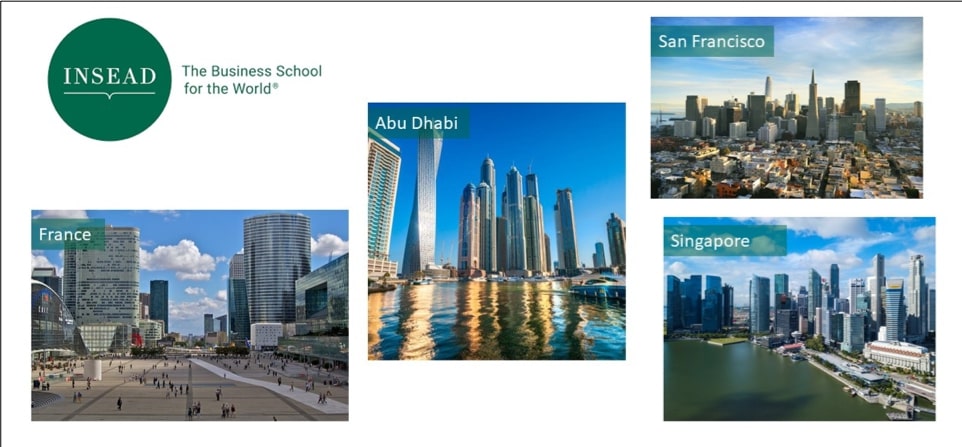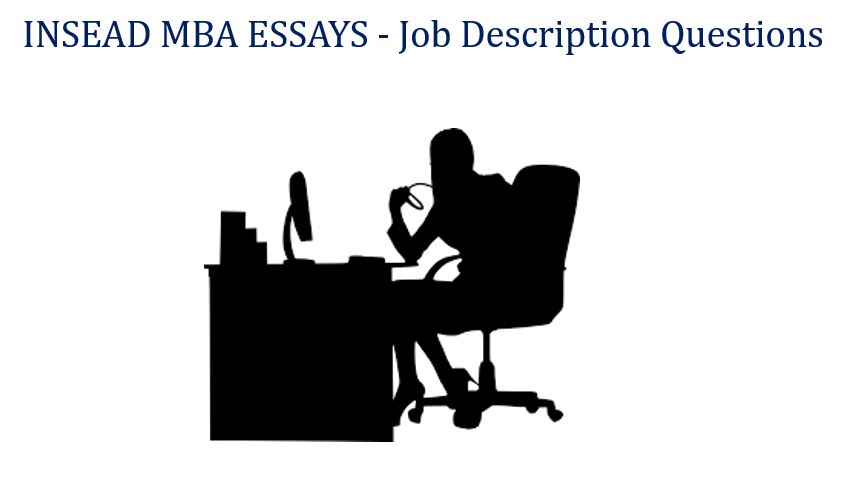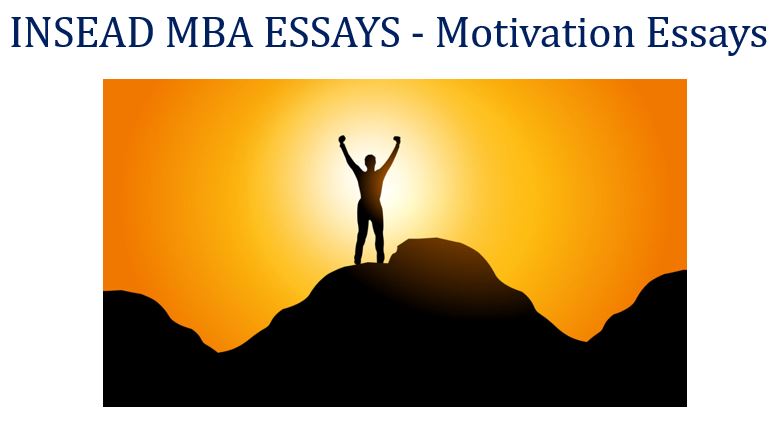INSEAD is one of the most popular business schools in the world, and among the best 1-year programs globally. With campuses in France, Singapore, Abu Dhabi, and now in San Francisco, it is truly “the business school for the world”. INSEAD is among the few top schools globally with two intakes in a year – September intake and January intake. Candidates, therefore, can plan their application in a manner that instead of applying late to one intake, may apply early to the next intake.

Here are the INSEAD Application Deadlines for the September 2024 intake.
INSEAD MBA Application Deadlines 2023-2024
| Round 1 | March 07, 2023 |
| Round 2 | April 18, 2023 |
| Round 3 | June 27, 2023 |
| Round 4 | August 08, 2023 |
INSEAD also has one of the most demanding MBA applications out there, with about 7 required essays to be submitted by the applicants. The two types of essays asked in the application are:
Job Description Questions
Motivation Questions
In this article, we will go deeper to analyze the expectations and the right approach for each of the essays that the INSEAD MBA application requires.
INSEAD MBA essay – Job Description Essays

Job Description Essay 1
Briefly summarise your current (or most recent) job, including the nature of work, major responsibilities, and where relevant, employees under your supervision, size of budget, clients/products and results achieved. (200 words maximum)
Schools often ask this question somewhere in their application, not always categorizing it as an essay. INSEAD has dedicated a full essay to it, clearly with the intent of understanding your current role deeper – remember, it’s a one year program and you will start connecting with recruiters even before your program is mid-way through.
Straightforward as it may seem, there are a few imperatives you should stick to while writing this essay:
- Do not lift and drop from your job description. JDs are the worst way to introduce a function to the Ad-Comm. You don’t want to sound like a boring HR officer reaching out to job-seekers.
- Instead, you may want to break your work down into smaller nuggets, simpler pieces. But I won’t stretch this exercise to the level of explaining it to a six-year-old kid. Remember, the Ad-Comm is a group of accomplished individuals, but they may not be accomplished in your field. Hence this is the first test of your MBA application — how easily can you explain a complex value proposition to a client if you were consulting them at McKinsey. The skill to simplify your job but not vehemently play it down is what this essay begets. For example, something like:
“I am the sole contact in the first line of defence for risk portfolio of structured rates derivatives and exotics focused in EMEA region, supporting an HFT desk based out of London. This also requires an examination of market movements in rates, tenor volatilities, curve spreads, and time decay. I am also responsible for issuing dealing authority to designated Volcker sub-desks for effective market making and to curb intuitive punting.”
… can be presented as:
“I serve as the primary analyst for assessing and managing market risk in EMEA portfolio of structured rates derivatives and exotic products worth $20 billion. I support the London desk, which deals in high-frequency trading. I have been working in this role for last 3 years. The role requires on a daily basis, a detailed analysis of factors of market volatility. I am also responsible for issuing guidelines to Volcker desks to ensure legal and risk-appetite boundaries are not breached. I work in a team of eight people, of which two report directly to me. The job requires intense analytical, quick-thinking, and cross-functional skills.”
- Short, crisp sentences
- Avoid industry acronyms and jargons
- Simple explanation, but not utterly simple
- Clear mention of teamplay (working in a team of () people, working across cross-functional teams, directly work with several lateral teams, etc.)
- Managerial leadership (if any)
One may find it tempting to copy-paste certain points from the resume, but remember, there are no shortcuts to success (certainly not at INSEAD). The adcom has your resume as well, and it may not be exciting to read the same lines again.
Job Description Essay 2
What would be your next step in terms of position if you were to remain in the same company? (200 words maximum)
Tricky, but not difficult. Applicants often present how they have hit a glass ceiling and that an MBA will be the solution to all their problems. Bad idea, always! If you can’t show that you are doing awesome at work, you are more likely looking for an exit route and not the path to success. This question seeks to understand how well you are doing.
This essay demands a candidate to lay down a roadmap they have envisaged for themselves — MINUS the MBA. What if you hadn’t thought of doing an MBA? What if you saw multi-fold growth in your current role/organization/sector? What if you loved your job so much that nothing could break you away from it? What if you didn’t have Colin Farrell from Horrible Bosses at work? What if due to a financial constraint, or God forbid a personal issue, you just couldn’t go for an MBA? Well, the reason isn’t important—you ought to think, what if you were going to continue in the same firm?
Here, INSEAD wants you to introspect. The Ad-Comm wants to give you a chance to see if you could convince yourself that you needed an MBA before you wrote it down for them. What are the next steps you should be taking to climb up the professional ladder in your firm? How long before you were going to hit a promotion? Are there any pockets of learning in your current role that you are yet to consider? How would your responsibilities change, evolve, and transform over time? All these questions would give you an ideal springboard to ace this essay!
Towards the end, it would provide a nice footnote if you candidly addressed the gap that an MBA degree would bridge, and that without an MBA, you won’t reach where you want and deserve to be. This should round up a great essay for you!
Job Description Essay 3
Please give a full description of your career since graduating from university. Describe your career path with the rationale behind your choices. (300 words maximum)
This essay requires you to rationalize the professional decisions you have made since graduation. From the outside, it looks like a simple task. You could glorify your decisions by painting a nice, ideal picture of your job. You could associate unparalleled benefits with your current role, which prompted you to take up the job in the first place. Learnings, virtues, experiences, ideas, avenues—everything that your career choices brought, you could list them down and submit a flawless essay.
But we all, including the Ad-Comm, are well aware, that most of our choices in the closely enmeshed social structure of the society are externalized. Our choices are governed by external factors such as parental expectations, peer pressure, societal norms, labels of the coloured collars, etc.—unless you were one of those few fortunate ones who heard their calling in the very beginning itself.
Thus, this essay beckons you to accept your decisions as your own. You might have made a rookie mistake of following the herd, but that doesn’t vilify you or question your decision-making abilities.
Accepting those erroneous judgments showcases a strong character. On the other hand, if you were smart enough to make all the right calls, justify that with examples. The key is to stay aware that any or all of your choices must have provided you skillsets, perspectives, insights, and experiences. It’s imperative that you clearly mention what you learned from them, as it shows that you aim to make the most of your decisions, whether right or wrong.
This essay also serves as a nice spindle of your career trajectory, thereby showing how streamlined or wayward your career has been. However, the good part is, that an MBA serves both kinds of audiences. Thus, there are no negatives of an essay that says you need an MBA to help you make an informed career choice/switch; or one that says that you want a launchpad to move further in your pre-MBA discipline.
Job Description Essay 4
Discuss your short and long term career aspirations with or without an MBA from INSEAD. (100 words maximum)
This could have been a standard MBA essay, but INSEAD has given it a major twist this year by including a “without an MBA” clause to it.
“With an MBA from INSEAD”
Here, INSEAD wants you to contemplate on your rationale behind wanting to pursue an MBA, and how it helps your cause in achieving your long-term career goals. At the same time, your short-term goal lays down a clear indicator of your thought process in making conscious career decisions. It wouldn’t look too coherent if you aspired to build an ed-tech venture for differently-abled people in the long run but were to seek a finance/banking role straight out of your MBA.
“Without an MBA from INSEAD”
This is tricky because, for most of the candidates, MBA serves as transportation from their current job to their aspirational role. They all rationalize the MBA as the next or the first step towards their long-term goals. In such a situation, to rationalize the same set of goals for the near and long-term without an MBA could be an uphill task, while to furnish a different set of goals could highlight your indecision.
In such a situation, the most astute way of enlisting your goals is to keep them realistic while being ambitious and visionary. You should give it a good amount of thought and come up with more than one way of achieving your targets. For this, surfing LinkedIn to see people with different profiles working for the same organization could be a good starting point. You could also look at several certification courses being offered online, which intend to cover at the least the theoretical MBA curriculum. Be sure to put forward some realistic estimates on the timelines by which you aim to achieve these goals if an MBA didn’t happen. It can act as a marker of clear and resolved thinking.
INSEAD MBA Essay – Motivation Essays

Motivation Essay 1
Give a candid description of yourself (who are you as a person), stressing the personal characteristics you feel to be your strengths and weaknesses and the main factors which have influenced your personal development, giving examples when necessary. (500 words max.)
This has been a trademark INSEAD essay for some years now. From the outside, it may give off as a mirage of a professional essay wanting of you to wax a lyrical about your strengths, while passing a few weaknesses off as hidden strengths (read: extreme workaholism, not able to say no, strict ideals, and principles, etc.). No. A big, fat, blunt NO. One shouldn’t make the mistake of treating it as a method to perform a SWOT analysis, or even risk weighing it as a medium to make the Ad-Comm hear what they might be reading in five thousand other applications. The key to ace this essay is simple—EMBRACE AND NARRATE YOUR VIRTUES AND VICES ALIKE.
This essay is more about what makes you…you. Who were you as a child? What was your upbringing like? Those childhood fantasies, parent/sibling relationships, your neighborhood, your school. What drove your first major decisions? Was there a laughable incident during childhood when you exhibited your first business model to the outside world? Or a seminal moment when your sibling or a friend introduced a novel concept? Some personal experiences leading to a fundamental shift in the worldview?
Remember—every applicant in your pool is hard-working, dedicated, honest, meticulous, and so on. The Ad-Comm reads about the same set of qualities over and over again. What truly sticks is the story behind each virtue. You’d never be remembered as a team player. But there is a higher chance of being remembered as a high-performing team player who copped the fall for a collective failure so that the weakest member wasn’t fired. [example] STORYTELLING, remember.
Here, do NOT hesitate in laying bare your inadequacies, if there were any [unless you believe otherwise]. Remember, this essay is about you the person, not you the achiever. Unfulfilled dreams, inevitable disturbances, any inclination you couldn’t make big in—IT IS OKAY TO BE IMPERFECT. Characters are made during adversities, so recall what you learned off your bad days. Self-awareness makes a person attractive, cover-ups don’t. A balanced mix of your strengths derived from situations resulting from your weaknesses is the cornerstone of this essay.
By this time, you should be 375-400 words into the essay. At this point, your essay is in the weeds, and this is where you exactly want it to be. Now is the time to thread every narrative into a streamlined, cohesive plot and answer some pertinent questions to put a decisive floor to your story:
- How does an MBA add to your personal development? How does an MBA specifically from INSEAD consolidate this point?
- Professional achievements aside, what is it that you really look ahead to achieve? What makes you happy? Does this step bring you any closer to that goal?
Before you set out to write this essay, try this small exercise—think of one word that best describes your whole life as of yet. Just make that the title of the story you are about to narrate!
Motivation Essay 2
Describe the achievement of which you are most proud and explain why. In addition, describe a situation where you failed. How did these experiences impact your relationships with others? Comment on what you learned. (maximum 400 words)
Usually, B-schools ask candidates to write one essay on a standout achievement, and another on their lessons from failure. What INSEAD has done here is squeeze a lot of things into one essay—achievement, failure, interpersonal relationships, and impact on them, learnings, etc. Hence, more than descriptive, you ought to be smart here.
In an ideal structure, this essay should follow a 200-100-100 scheme. 200 for the two anecdotes you want to pick up for success and failure. 100 are to be devoted to the impact they might have had on your interpersonal relationships. Final 100 are your insights, learnings, and takeaways.
Selection of events
Many candidates come up with this question—”what should we pick as the biggest achievement of my life?” There are certain markers of an “achievement” being the right fit for this essay:
- Look out if your “achievement” had any major external impact. You could have been a topper throughout, but that’s not the kind of achievement this essay is looking for. You could have helped underprivileged kids with what you learned at school and helped them pass their exams with great marks. Or you could have invented something or discovered a cool scientific fact during college and received a patent. Again, without undermining your achievement AT ALL, it’d have sounded a much better fit FOR THIS ESSAY had you also set up a college patent advisory to make your peers understand the nuances of patent registration and safeguarding their intellectual property.
- See if any of your achievements are global/international in nature. INSEAD is big on global experience and international exposure, and such an achievement could really turn the tide in your favour. For e.g., were you in London on the day of Brexit helping your firm evade losses due to market crash? Or did you initiate a global movement for handicraft artists and raised big funds to help their cottage businesses? Or do you like mountaineering and have managed to scale some or all of the seven major peaks of the world? Measure the international quotient of your achievements.
- Another thing that can really hit a home run is success against an impediment. All humans are susceptible, and all susceptible are humans. Each one of us has struggled with an impediment at least once in their life. They may come in the form of a disability, an addiction, a personal loss, repeated failures, bullying, racism, sexism, conservatism, disturbed surroundings, etc. What really matters is that you or anyone trumped that impediment and came out of it. Such an inspiring story weaves your strong character, tenacity, and resilience into a nice fabric of wholesomeness and makes you a strong candidate in the eyes of Ad-Comm.
When it comes to “failures”, again there are a few markers. The Ad-Comm expects to read about the moments where despite your hard work, efforts, and sincerity, you failed to achieve desired results. Your failures may be attributed to one or several reasons—lack of ability or training, unexpected roadblocks, or any other external factor. Explain the circumstances in which you were stranded in a failed situation. But do understand this—in no way, this narrative is going to make your application any weaker. In fact, a joke goes around the candidate circles that the bigger the failure, the stronger is your essay. Your choice of the event reflects your ability to own up your failures as much as your successes, which in turn speaks volumes about your character. However, more than the selection of event of “failure”, you should focus on HOW you coped with a particular failure. We may have relatively smaller failures which simply called for a correction of course. And then there are some life-altering failures that change your worldview for good. You need to pick those inflection points and translate them into this essay.
Learnings and relationships
The next 200 words represent the fulcrum of this essay. You are required to showcase how efficient and judicious you were in learning from your laurels and your mistakes. It also shows your ability to break the situation down into simpler pieces and segmenting your life-events with rationality and precision. It is equally important that your successes don’t lift you off the ground, and your failures don’t drive you into it. Your successes shouldn’t give you an Imposter Syndrome, you should be able to weigh them absolutely. You ought to mention the key insights you got about your own character, personality, and behavior from this retrospection.
You are also required to reflect upon your interpersonal relationships as your life went through ebbs and flows. What were some key soft lessons you picked up about people? Have your achievements and failures made you appreciate the diversity of thought and humility? Have they made you a better team-player? Do you understand the difference between authority and leadership? Are you now able to delay your judgments about others until they have proven themselves? More such examples about people-relationship should give your essay more colour and an extremely productive ending.
Motivation Essay 3
Describe all types of extra-professional activities in which you have been or are still involved for a significant amount of time (clubs, sports, music, arts, politics, etc). How are you enriched by these activities? (maximum 300 words)
INSEAD is highly focused on the extra-curricular achievements and activities a candidate has been a part of throughout their career. The Admissions Committee looks for those who have maintained a parallel hobby/passion while pursuing their mainstream professional goals. In this regard, it helps greatly if a candidate has remained engaged with a particular activity even after college since most of the extra-professional activities are given a platform during that phase. Hence it carries a lot of value to have remained loyal to your hobbies.
At this juncture of your application, the Admissions Officer going through your profile knows very well about your career trajectory and aspirations. While you could have laid down some great points about your professional decisions, MBA demands an all-round personality and not a proverbial bookworm. Thus hobbies like sports, music, visual and performing arts, traveling, quizzing, etc. are valued highly. Any engagement with social impact also finds its space in this essay (unless you have a long-term career goal in this field and have already described it in previous essays). Initiatives and participation in education, environment, gender and sexuality, disaster management, political awareness, etc. are invaluable additions to this essay.
One critical point to AVOID for candidates is to treat this essay lightly. Any mention of leisure activities such as “listening to music, reading books, watching movies” can be hugely detrimental, since these kinds of activities do not project a candidate’s all-round and unique development. However, an extended interest in these areas—such as blogging/vlogging about movie/literature reviews, members of a music club to explore hidden talent, and bring it to limelight through social media pages and distribution channels, etc. are also qualified ingredients for this essay.
For the second part of the prompt, candidates should focus on soft skills they develop apart from hard skills learned for an activity. A solo sports player (ex. Badminton) can narrate about their lessons in self-motivation, self-control, personal regime, and tenacity; while a team-sport player can cite learnings like teamwork, adaptability, compassion, collegiality, responsibility towards others, loyalty, etc.
The same goes for engagements in music, dance, other artforms, social work, traveling. You could pen stories about the kind of people you met during your travels and what all did you learn from them. The romance of roaming around in unfamiliar streets and still finding a charm in doing that, or the beauty of enjoying the process of working towards a common humanitarian cause while it lasts.
This essay should bring out your social and cultural quotient, and basically tell the Admissions Committee how much fun and congenial you can be. Do note that INSEAD categorizes this as “Motivation Essay” for a very strong reason. What you do beyond your work, things that drive you on a daily basis, activities, and interests that you are passionate about, deeply establish your motivations in life and the qualities that define your personality.
Applying to other top schools? You may benefit from the following:
- Kellogg MBA Essay Analysis
- MIT Sloan Essay & Cover Letter
- Wharton MBA Essay Analysis
- Yale SOM Essay Analysis
About the Author

Prashant Tibrewal is the founder of Admit Square Consulting and has mentored 1000+ MBA aspirants to get into top global universities such as Harvard, Stanford, INSEAD, Oxford, HEC, ISB, etc. Prashant has also served on the Board of the Association of International Graduate Admissions Consultants (AIGAC) and led the AIGAC Conference 2020, attended by admissions officers from 25+ top-ranked MBA programs.
Admit Square Consulting has mentored applicants from diverse backgrounds to apply to top MBA programs. With a proven track record of 10+ years, and admits to universities such as Stanford, MIT, Kellogg, Cambridge, INSEAD, etc., Admit Square was awarded the Most Successful International MBA Consulting Company in India at the India Education Awards, 2019. With a team of Consultants from top business schools such as MIT, Yale, LBS, and Oxford, Admit Square offers 100% Money-back Assurance on its services. You may send your details to info@admitsquare.com for a free profile evaluation.
If you are planning to take the GMAT, we can help you with a personalized study plan and give you access to quality online content to prepare. Please write to us at acethegmat@e-gmat.com. We are the most reviewed GMAT prep company on GMAT club with more than 2500 reviews and are the only prep company that has delivered more than 700+ scores than any other GMAT club partner. Why don’t you take a free trial and judge for yourself?














